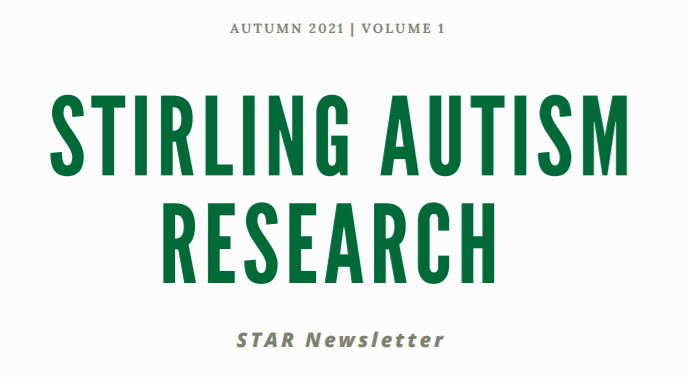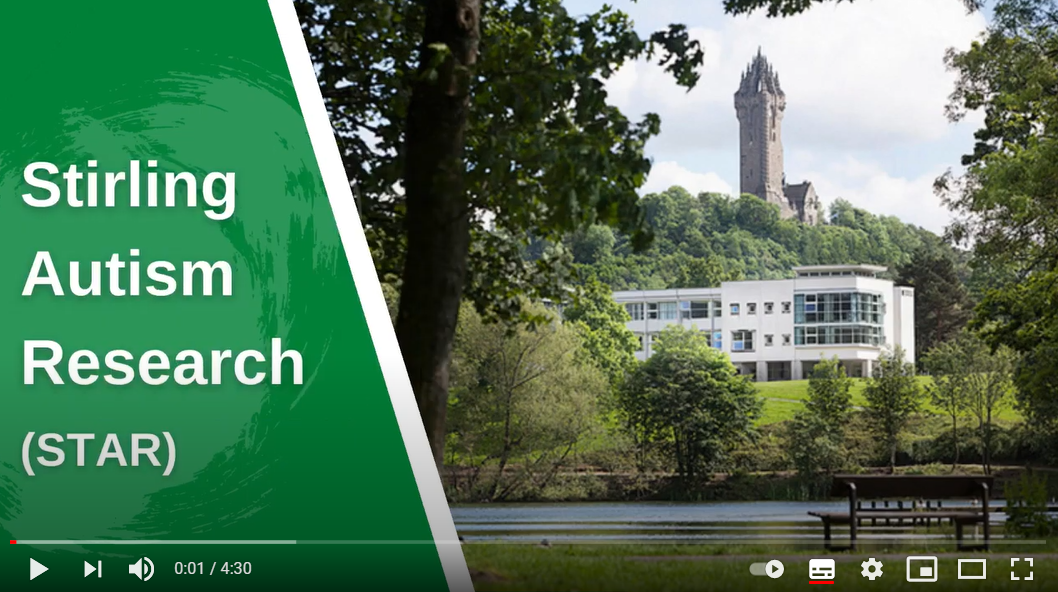Home » News (Page 2)
Category Archives: News
The first STAR newsletter!
We are excited to share our first STAR newsletter! Our plan is to have regular newsletters (every few months) which update you on what we have been doing. In this first ever STAR newsletter, we’ve got a lot to cover! Find out about our recent research, our busy conference season, and what we’ve got planned for the future of STAR. If you’ve got any feedback on our newsletter, please email us at autismresearch@stir.ac.uk. Click below to download our newsletter, and we hope you enjoy it!
New video series about our research!
We have recently launched our new video series which aims to explain our research projects in less than five minutes! Our first video discusses Dr Eilidh Cage’s recent paper with collaborators from Royal Holloway and UCL on camouflaging and stigma. You can watch the video on YouTube below:
This video was created by Lauren Paterson, a MSc placement student. We’ll be sharing more of our videos each month, so stay tuned for more! And, if you have any feedback about our videos, please email us at autismresearch@stir.ac.uk
Reflections on a STAR Placement
Recently, Lauren Paterson completed a 10-week placement with STAR as part of her MSc at the University of Stirling. While many of our placement students assist with our research projects, this year we tried a new placement which involved supporting the STAR team with our social media and public engagement activities – something we want to do lots more of! In this blog, Lauren reflects on her time with STAR.
My name is Lauren Paterson, and I am a student at the University of Stirling undertaking a Psychology (Conversion) MSc course. This course stood out amongst others due to the placement opportunity it provided, as it was important for me to gain practical skills and knowledge within Psychology and make an impact. I sought and secured a placement with Stirling Autism Research, as a Communications Assistant, beginning my placement in April.
While I had witnessed the strengths and challenges for an autistic family member throughout their education and into employment, I had no knowledge of what constituted autism research and community issues before I started this placement. What immediately struck me as I began my placement was my lack of awareness of basic autism knowledge and terminology, such as the general preference for identity-first language. Although I was very new to autism research when I started this placement, I was pleased to find that many autism research articles catered to non-experts, providing lay overviews below the abstract. While I found most articles to be accessible, at times I was overwhelmed by the contentious nature of topics spanning terminology to autism research conventions. Grasping these divisive topics was a steep learning curve, however, I was grateful to have been exposed to these controversies that I would have been otherwise ignorant to, and became passionate about spreading awareness and being a more effective supporter of autistic people.
As a Communications Assistant at STAR, I worked alongside Dr Eilidh Cage developing Twitter schedules, blog posts and YouTube videos. Over my 10-week placement, we were able to increase traffic across STAR social media accounts, and I am happy with the progress we have made and especially proud to have created accessible content that can hopefully reach many different people, through our series of digestible video summaries of STAR research articles. You can check out the first video I made here, and more will be released on the STAR YouTube channel in the months to come!
I am very grateful for the support of Dr Eilidh Cage and Dr Monique Botha throughout this placement, I have learnt so much that I can take with me and apply in the future. I will be very sad to leave STAR however, I am proud to played a small part in the important work they do in order to foster a more inclusive and accepting society for neurodivergent people.
Leverhulme Early Career Fellowship awarded to Dr Monique Botha
We are delighted to announce that Dr Monique Botha has been awarded an Early Career Fellowship from the Leverhulme Trust. The Fellowship will enable Monique to work on a significant piece of work for three years (starting later this year) at Stirling. The research project is called “Fragile Knowledge: Dehumanisation & Interpretation Bias in Autism Research”. Monique plans to investigate the role autism researchers play in the construction of autism knowledge. The project will use both textual analysis of existing literature, and experiments with autism researchers. Currently, there are many issues in autism research, such as the dehumanisation of autistic people, and Monique’s project will be one of the first to systematically examine these issues. The Fellowship will also give Monique the opportunity to foster collaborations and visit other researchers around the world (hopefully!). The project will have wide-reaching implications for ethical practices in autism research, and psychology as a discipline more broadly. Congratulations, Monique!
INSAR poster: Contextual References as a Mechanism to Support Time-Based Prospective Memory in Autistic Adults
Background:
In everyday life, we often need to ‘remember-to-remember’ to do activities in the future (prospective memory). Some of these tasks need to be carried out at a specific time (time-based prospective memory). Because prospective memory tasks are usually carried out during unrelated everyday activities (ongoing tasks), this kind of ‘memory skill’ is very demanding on our mental resources. For example, successful time-based prospective memory depends on self-monitoring the time while also remembering what needs to be done and when to do it. Research has found that giving people an idea of the context in which a future task will occur, can improve prospective memory accuracy in the general population. Although there is very little research on this topic in autism research, the findings tend to suggest that autistic people commonly experience general difficulties with prospective memory, and particularly have difficulties carrying out plans for future time-based prospective memory activities.
Aims:
The research looked at how context cues might support autistic people to carry out every day time-based prospective memory tasks. The researchers predicted that context cues would improve time-based prospective memory accuracy to a greater extent for autistic people, compared to receiving no context information or receiving incorrect information.
Method:
The study included 62 participants, who were 38 autistic adults and 24 non-autistic adults. Participants were matched on age, gender and general intellectual ability (IQ). All participants first completed a No Context task and then completed a second task with different context information. The ongoing task was to sort words and pictures as either ‘foods’ or ‘non-foods’. Participants also had to keep track of time during the task, by checking an on-screen timer. For the time-based prospective memory task, participants had to remember to press a button when the clock showed 3-minutes. In the Correct Context and False Context conditions, participants were given information on when the target time would happen. The Correct Context cue should help participants to make more accurate prospective memory responses, but the False Context cue would likely show less accurate responses.
Results:
The researchers are still completing their analysis of the data. Their provisional findings suggest that targeted contextual information could help to reduce time-based prospective memory difficulties for autistic adults. They also observed that autistic adults were more vigilant in time monitoring – they checked the clock more often than non-autistic participants. Further analysis is being done to understand if autistic people use time monitoring combined with contextual information as strategies to support prospective memory. These early insights could offer new ways to potentially improving prospective memory and, in this way, support autistic people to live more autonomously in everyday life.
Check out the poster here:
INSAR panel: Global Insights on Understanding and Reducing Autism Stigma
At INSAR, Dr Botha and Dr Cage co-chaired a panel on autism stigma, which brought together cutting-edge and novel research exploring autism stigma from the perspectives of non-autistic and autistic researchers, using a range of methods, in different settings, from multiple geographic regions. Stigma involves the discrediting of an identity or a negative perception of differentness. Research shows that autism is a stigmatised identity, with non-autistic people holding negative biases against autistic people. Furthermore, stigma can be a life-limiting experience for autistic people: exposure to stigmatising events and attitudes relates to worse mental health outcomes and higher psychological distress for autistic people both in cross-sectional and longitudinal studies. Therefore, understanding stigma is an important topic within research, in order to reduce and prevent stigma.
The panel consisted of four talks, which covered the following topics: Dr So Yoon Kim and colleagues from Duksung Women’s University (Seoul, South Korea), Yonsei University (Seoul, South Korea), and Department of Psychology, City University New York (United States), presented their work on “A Cross-Cultural Comparison of Stigma Toward Autism in the US and South Korea”. Their study was a cross-cultural comparison of autism stigma in South Korea, a relatively collectivistic and ethnically homogeneous country, and in the US, a relatively multicultural and individualistic country. Overall, 296 American and 494 Korean participants completed online surveys. The researchers found that Koreans reported higher autism stigma than Americans. Heightened vertical individualism, less accurate autism knowledge, less pleasant and frequent previous contact with autistic people, and higher cultural tightness predicted greater stigma.
Dr Eilidh Cage presented work with Taylor Doyle, a former Stirling MSc student, on “Investigating the Implicit and Explicit Attitudes of Primary School Educators in Scotland Towards Autism”. This study aimed to investigate Scottish educator’s explicit (i.e. conscious) and implicit (i.e. unconscious) attitudes towards autistic children, and to understand the relationships between educator’s attitudes, knowledge and experience. Seventy primary school educators working in Scotland took part, completing measures of attitudes and knowledge about autism. Overall, participants held positive attitudes towards autistic children in both explicit and implicit attitude measures, although 24% showed negative implicit attitudes. Younger educators with less experience had more positive attitudes, perhaps reflecting societal changes in perceptions and greater exposure to autistic experiences in recent years. Enhanced knowledge also predicted more positive attitudes.
Dr Monique Botha and colleagues from the University of Surrey and UCL presented their work entitled ‘“It’s Being a Part of a Grand Tradition, a Grand Counter-Culture”: A Qualitative Investigation of Autistic Community Connectedness, Stigma, and Identity.’ This interview study with 20 autistic people looked at autistic people’s experiences of the autistic community, and noted how stigma and discrimination seemed to push autistic people towards autistic community connectedness (ACC), whereas an internalisation of that stigma seemed to push people away. Three domains (belongingness, social, and political connectedness) appear to inform the broad construct of ACC. This community level togetherness may provide a form of social resource to help protect against stigma and discrimination, and work to further the political causes of the autistic community.
Finally, Desi Jones and colleagues from the University of Texas at Dallas presented their research on “Effects of Autism Acceptance Training on Explicit and Implicit Biases Towards Autism”. This study aimed to determine whether training to improve autism knowledge and familiarity in non-autistic adults is associated with more favourable attitudes about autism. A total of 238 non-autistic adults were randomly assigned to one of three conditions: 1) autism acceptance training, 2) mental health training, or 3) a control condition. They found that a brief video training about autism was associated with more accurate autism knowledge and more favourable attitudes towards autism compared to the general mental health training video and a control condition. However, the benefits of training were restricted to explicitly held attitudes, with negative implicit beliefs about autism present across training groups.
The panel was followed by a reflection on the four talks by Dr Jac Den Houting (Macquarie University, Australia) and a question and answer session with attendees. The discussion covered topics such as intersectional stigma (what happens when someone has multiple minority identities?), internalised stigma (how can we prevent the internalisation of all the stigma autistic people are exposed to?), and the role of society and in particular autism researchers in perpetuating autism stigma. Although we are making progress, there is clearly still a long way to go.
If you have any questions about this panel, please contact Dr Eilidh Cage and Dr Monique Botha (eilidh.cage@stir.ac.uk & m.d.botha@stir.ac.uk).




